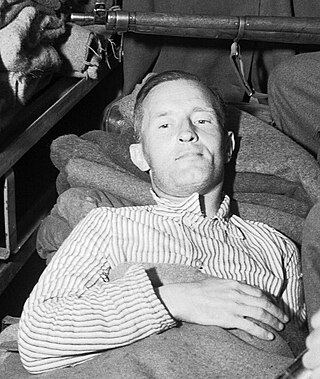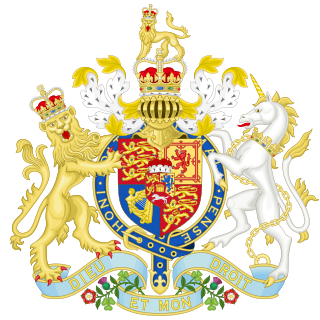
Under the law of the United Kingdom, high treason is the crime of disloyalty to the Crown. Offences constituting high treason include plotting the murder of the sovereign; committing adultery with the sovereign's consort, with the sovereign's eldest unmarried daughter, or with the wife of the heir to the throne; levying war against the sovereign and adhering to the sovereign's enemies, giving them aid or comfort; and attempting to undermine the lawfully established line of succession. Several other crimes have historically been categorised as high treason, including counterfeiting money and being a Catholic priest.

The Court of Session Act 1808 was an Act of the Parliament of the United Kingdom which reformed Scotland's highest court, the Court of Session. Reform of the Court of Session had been proposed as early as 1805 by the Whig government trying to impose a system based on that of England, especially the use of a civil jury trial. That particular government fell before their reform bill was enacted. In 1808, reform was pushed through by a Tory government. The Court was split into two divisions. Judgments of the new divisions could only be appealed to the House of Lords at the leave of the division, or in the case of a dispute between its judges. Decrees of the Lords Ordinary could only be appealed to the House of Lords after being reviews by the Divisional judges. The Act also established a commission to review the processes of the Court of Session, including the possibility of the introduction of jury trial and the creation of permanent Lords Ordinary. The Commissioner's review led to two further Acts, the Court of Session Act 1810 and the Court of Session Act 1813. These two Acts created the existing system of two divisions known as the Outer House and the Inner House. Trial by jury came later with the Jury Trials (Scotland) Act 1815.

The Court of Session Act 1810 was an Act of the Parliament of the United Kingdom reforming Scotland's highest court, the Court of Session. This Act was a follow-up Act to the Court of Session Act 1808 in reforming the Court of Session, creating the two divisions known as the Inner House and the Outer House.

The Criminal Lunatics Act 1800 was an Act of the Parliament of Great Britain that required and established a set procedure for the indefinite detention of mentally ill offenders. It was passed through the House of Commons in direct reaction to the trial of James Hadfield, who attempted to assassinate King George III.

The Treason Act 1695 is an Act of the Parliament of England which laid down rules of evidence and procedure in high treason trials. It was passed by the English Parliament but was extended to cover Scotland in 1708 and Ireland in 1821. Some of it is still in force today.

The Sedition Act 1661 was an Act of the Parliament of England, although it was extended to Scotland in 1708. Passed shortly after the Restoration of Charles II, it is no longer in force, but some of its provisions continue to survive today in the Treason Act 1695 and the Treason Felony Act 1848. One clause which was included in the Treason Act 1695 was later adapted for the United States Constitution.

The Treason Act 1945 was an Act of the Parliament of the United Kingdom.

The Treason Act 1800 was an Act of the Parliament of the Kingdom of Great Britain. It assimilated the procedure on trials for treason and misprision of treason to the procedure on trials for murder in certain cases. It was passed as a result of an attempt on the life of George III by James Hadfield earlier that year. The Criminal Lunatics Act 1800 was passed at the same time.

The Treason Act 1708 is an Act of the Parliament of Great Britain which harmonised the law of high treason between the former kingdoms of England and Scotland following their union as Great Britain in 1707.

The Treason Act 1543 was an Act of the Parliament of England passed during the reign of King Henry VIII of England, which stated that acts of treason or misprision of treason that were committed outside the realm of England could be tried within England. Those convicted of high treason would have their estates confiscated by the King and then be hanged, drawn and quartered.

The Treason Act 1746 was an Act of the Parliament of Great Britain. The long title is "An Act for allowing Persons impeached of High Treason, whereby any Corruption of Blood may be made, or for Misprision of such Treason, to make their full Defence by Council."

The Treason Act 1766 was an Act of the Parliament of Great Britain. The long title was "An Act for altering the Oath of Abjuration and the Assurance; and for amending so much of an Act of the Seventh Year of her late Majesty Queen Anne, intituled, An Act for the Improvement of the Union of the two Kingdoms, as, after the Time therein limited, requires the Delivery of certain Lists and Copies therein mentioned to Persons indicted of High Treason, or Misprision of Treason."

The Treason (Ireland) Act 1821 is an Act of the Parliament of the United Kingdom. It extended most of the English Treason Act 1695 to Ireland. Previously the 1695 Act only applied to England and Scotland.

The Heritable Jurisdictions (Scotland) Act 1746 was an Act of Parliament passed in the aftermath of the Jacobite rising of 1745 abolishing judicial rights held by Scots heritors. These were a significant source of power, especially for clan chiefs since it gave them a large measure of control over their tenants.

The Incitement to Mutiny Act 1797 was an Act passed by the Parliament of Great Britain. The Act was passed in the aftermath of the Spithead and Nore mutinies and aimed to prevent the seduction of sailors and soldiers to commit mutiny.

The Treason Act 1714 or Trial of Rebels Act 1715 was an Act of Parliament of the Parliament of Great Britain passed during the Jacobite Rising of 1715. Its long title was "An act for the more easy and speedy trial of such persons as have levied or shall levy war against his Majesty." It enacted that anyone who was in custody for high treason before 23 January 1716 could be tried anywhere in England, regardless of where they had allegedly committed their crime. Under common law a trial normally had to take place in the county where the crime happened.

The Sheriffs (Scotland) Act 1747 was an Act of the Parliament of Great Britain which applied only to Scotland. It stated that anyone who was prosecuted on or after 1 April 1748 for treason or misprision of treason could be tried anywhere in Scotland if the crime had been committed in any of the shires of Dunbartain, Stirling, Perth, Kincardine, Aberdeen, Inverness, Nairn, Cromarty, Argyll, Forfarshire, Banff, Sutherland, Caithness, Elgine, Ross, and Orkney. Normally a crime had to be tried in the shire where it had been committed. The Act also said that in such a trial, the jurors could come from adjoining counties, instead of the county where the trial was held.

The Treason Outlawries (Scotland) Act 1748 was an Act of the Parliament of Great Britain which applied only to Scotland. Its long title was "An Act to ascertain and establish the Method of Proceeding to and upon Outlawries for High Treason and Misprision of High Treason, in Scotland."
Juries Act is a stock short title used for legislation in the United Kingdom relating to juries.

The Treason (Ireland) Act 1854 is an Act of the Parliament of the United Kingdom of Great Britain and Ireland. It extended part of the Treason Act 1708 to Ireland, specifically the rules about giving the defendant advance notice of the witnesses and jurors in his case. It was repealed as regards Northern Ireland by the Treason Act 1945, which abolished the unique procedural rules which applied in treason cases. As of 16 January 2020 it remains in force in the Republic of Ireland.










